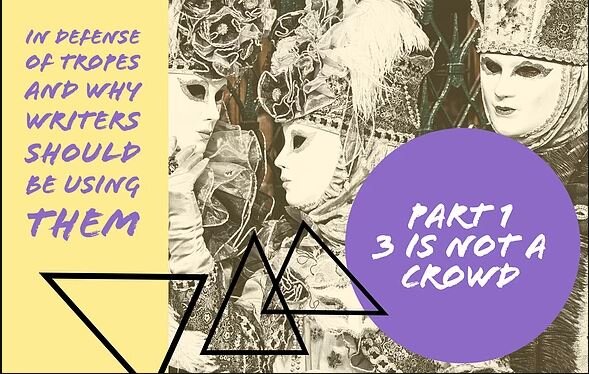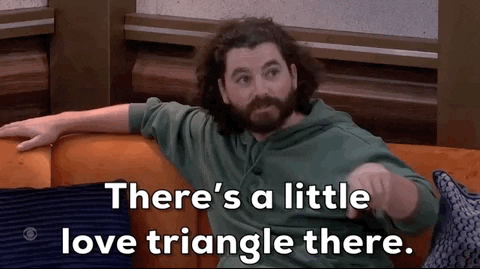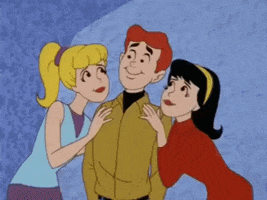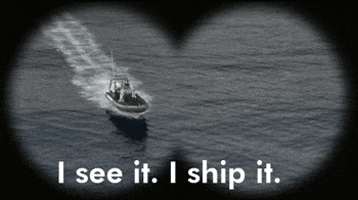In Defense of Tropes: Three is Not a Crowd
/As a child, I remember watching movies with my family, and I was always amazed at how my mom would say verbatim the line that the actor said before he said it. Me and my sister would marvel at her. “Whoa, Mom, how did you know? Did you watch this already?” Little did our kid brains realize was she had in fact watched it already, about a hundred times in the form of tropes. Those common, overused themes and plot devices. We see them everywhere. They make stories predicable and annoying.
Almost every book blogger and book tuber across the land has something to say about tropes. They usually have a title like ‘10 worst tropes and why you shouldn’t use them’ or something to that effect. These blogs are so common they’ve become a trope in and of themselves.
Disclaimer: I’m not going to bash these blogs, in fact, I quite enjoy them. I’m in no way saying that using tired tropes make good art or that you aren’t allowed to hate them. In my young adult years, as something got really popular, I got turned off it. That’s right, I was that edgy non-conformist who used terms like ‘overrated’, ‘sell-out,’ and ‘that’s so mainstream.’
Now, I’m older, mildly wiser, and found that no number of independent authors and film buffs complaining about tropes have made them go away. Yet still they try and try and try again. It’s enough to activate that inner contrarian from my teenage years, urging me to rebel against those rebelling.
Therefore, this blog series is not going to be me listing tropes and telling you why they’re dumb and to avoid them. Rather, I’m going to defend them.
But why, you ask?
I’ll tell you why.
All those tropes you’re not supposed to like because they’re so overused are precisely that because… well… people actually like them.
The market doesn’t lie, folks. If something consistently shows up in fiction, chances are, it’s because it sells. Readers want it. Sometimes those sales are driven by clever marketing campaigns, but that can’t possibly account for years and years of steady sales. Only a good product does that. Continued sales of a book or genre occur because there are long lines of people wanting more. Every popular story—every single one—is filled to the brim with universally recognized tropes that no matter how much we get annoyed with them, they stick around. If people hated them that much, they’d stop reading them and authors would stop writing them. It’s that simple.
In part 1 of this blog series, I’d like to talk about the most common and arguably the most hated trope in existence. Love triangles. We find them in nearly every work of fiction, particularly in the romance and teen genres, but that is not to mean they can’t be found in every other genre.
The basic love triangle is one love interest, usually the protagonist, must choose between two suitors. These suitors, usually men, compete for the love of the protagonist, usually a woman. The choice between the two is often clear cut. One is obviously the better man for her and the other is either a total loser or a cad, but he serves as an obstacle to true love or a source of conflict, like Jacob in the Twilight Saga; or a sad sort of comic relief. Think Ducky in Pretty in Pink. Sometimes the competitors are brothers, like in Legends of the Fall, or besties like Betty and Veronica, providing even more tension and conflict. As long as you have two people who want the same person, whether it be for love, lust, or obsession, that counts as a love triangle.
Triangles, in one way or another, are usually broken by the end when someone makes a choice, moves on, or dies. What makes each love triangle timeless is all the ways it can end. There is virtually no limit to what you can do with just three characters.
So, let’s look at the three main arguments (you can call them strawmen, if you want) against love triangles, and I’ll knock them down one by one.
The Plot Argument
Many people, mostly authors or someone otherwise educated in story structure, will say love triangles are forced or add nothing to the plot, and that’s why they shouldn’t be used. I’ve heard people say that if they find out there’s a love triangle in a book, they won’t read it. But is this fair? Should aspiring novelists steer clear of love triangles in service of the plot?
Short answer. No. That’s patently absurd.
Love triangles have been an integral driver of plots going back to the Iliad. One of my favorite authors of all-time Alexandre Dumas, author of the Three Musketeers and The Count of Monte Cristo both have love triangles that kick off the entire plot and drive the characters’ motivations throughout the story. They serve as a source of conflict that challenge our characters and carry them, often kicking and screaming, through their arcs.
Outlanders’ Claire and Jamie’s relationship ultimately becomes stronger as a result of Captain Jack Randall’s relentless pursuit of Jamie. Often when people think of the love triangle in Outlander, they’ll think of Jamie, Claire, and her husband Frank.
We forget that the most prominent triangle…
in the first two books at least, was between Claire, Jamie, and Jack. Albeit a pretty demented one.
This brings me to the point I’m trying to make.
A good love triangle doesn’t stick out; it’s natural and necessary. It camouflages into the overall plot so seamlessly that all you can do is root for the characters and experience the adventure effortlessly unfold before you. If you have trouble following a plot due to a shoe-horned triangle, your problem is bad writing, not triangles themselves.
The Moral Argument
I’ve heard some people rail against love triangles simply because they tend to traipse into shady territory. Anyone who’d lead two people on for the length of a novel is not someone you’d want to be in a long-term relationship with. And no self-respecting person would debase themselves for the affections of someone who clearly wants to be with someone else. I’ve made this argument myself, in regards to Archie Comics.
Archie is a total spineless dweeb who can’t do anything right!
He’s a dumbass who treats women like garbage and can’t even fix his own broken-down car!
And for some reason, he has the vivacious, sassy, and rich Veronica, and the kind-hearted, super-smart, girl-next-door Betty falling over themselves for this idiot’s attention. Even worse, these girls are supposed to be best friends. Veronica doesn’t even like Archie, she just wants him to spite Betty and to annoy her dad. Betty has everything going for her, has her choice of any boy in school, and she wastes her life on a guy that gives her zero respect and knowingly takes advantage of her feelings to get money, car repairs, and action on the side. Despicable! What kind of message is this sending our children?
Although those pearl clutchers have a point with Archie Comics as they are aimed at a younger audience, the same reaction is applied to all the other love triangles in young adult and even adult fiction. Well, I hate to break it to you (I don’t) but people don’t read fiction for moral guidance or relationship advice. They read them for entertainment. And yes, Archie Comics are entertaining AF. In fact, as much as I complained about the ridiculous antics of Betty and Veronica, the Archie collection I’ve racked up over my childhood is 95% Betty and Veronica whose primary storylines revolved around, guess what? The love triangle. Funny how that works.
My point is, yes, stringing people along is wrong, and you shouldn’t do it. You also shouldn’t date vampires, carry out an extramarital affair, participate in a heist, or become an assassin. Yet you’ll never find a litany of articles with headlines like: ‘Why killing people in fiction is toxic and has to stop’ or ‘Time to assassinate the lovable assassin trope.’ Nobody believes their child will become a killer for hire after reading too many Sarah J. Maas novels. I think the rest of us can enjoy a hokey love triangle or two without condoning serial friend-zoners.
So why do love triangles, that are not nearly as bad as theft or murder, get such a bad rap? I have some theories (not to be mistaken for anything close to scientific), one being: Love triangles, like anything else that explores human sexuality, can quickly devolve into the world of taboo. For most of us in the privileged West, we can watch the most violent acts on screen or read about genocidal maniacs on the page with captivated interest, but read about a duplicitous usurper coming to break up a marriage or witness the nice girl go for the jerk who will never care about her like our protagonist does, will push some buttons. Perhaps because it hits a little closer to home. Who among us hasn’t experienced or feared the deterioration of a relationship where a third party was involved? This makes love triangles that much more irksome and frustrating as they play out on the page.
That should give you even more of a reason to seek out love triangles in fiction because you’re tapping into something real. Something universal. And what better reason for fiction to exist than to put the mirror of the human condition in front of our faces and say, “Look!”
The Feminist Argument
Disclaimer: The following is just my opinion on one particular argument against the use of love triangles, which tends toward a feminist slant. This opinion is not meant to be taken as a criticism of or reflects my opinion on the feminist movement as a whole. I also will make some generalizations about the sexes. I’m aware that there is overlap between men and women, so if you’re a woman and it doesn’t apply to you, then great, move it along.
With that out of the way.
In recent years, more and more complaints about love triangles, particularly in young adult fiction, focus on the implications on female empowerment. The arguments generally go like this: Love triangles are problematic because they teach young women that choosing a man is more important than her own independence or the key to her being whole. It’s along the same lines of the fairytale plotline that sees a woman married at the end and living happily ever after. While, I largely agree with this sentiment, I take issue with these types of arguments.
Choosing a life partner, if not the most important decision a person makes in their life, is easily in the top three. Choosing a partner is a high-stakes game, every bit as high stakes as choosing a career or choosing where to live, perhaps even more so. Forget the biological imperative of getting the best genes for potential offspring for a minute. Choosing the wrong person can have disastrous consequences in your everyday life, especially for women (an increasingly so for men). Choose the wrong person? At best you’ll be unhappy, at worst you’ll be broke, in jail, or dead. Choose the right person? At worst you’ll have to compromise some independence, at best, you’ll have love, financial stability, and someone in your corner to get you through those dark times. It surprises me that not more feminist thinkers speak more on this since living a single life of independence, although a great choice for some women, is not always optimal for others.
Now, I’m not suggesting love triangles in trashy romances will help women select a mate, but the fact that they are so popular with women tells us something important. The drama around relationships gets our motor revving because we instinctively perceive them as high-stakes plots, similar to car chases or a serial killer slowly walking toward his victim with a knife. So, if you’re a woman and you enjoy a good love triangle, that’s a good thing. You’re not any less feminist for doing so. You’re not being socialized to like it, it’s mostly instinctual. Just as watching explosion and rapid gunfire activates our self-preservation instinct, watching two handsome warriors fight for the hand of the queen activates our relational instincts, and we women have those instincts in spades. And for good reason. It’s a matter of survival.
There are also plenty of examples of love triangles in male entertainment media one could point to, such as in video games. The Witcher 3 comes to mind. There’s also a huge male market for harem anime (which presents more like a love hexagon if you will). Feminist articles come down on these too, saying they’re objectifying women.
However the feminist arguments against love triangles shake out, they all seem to sound like the age old, ‘if men like it, it’s objectification, if women like it, it’s socialization.’ But the real answer is much simpler. Men and women like love triangles because they’re fun. Nothing more, nothing less.
Humans are natural shippers.
Shipping has long been a facet of cultures around the world for thousands of years.
Our ears perk up to gossip about who ended up with whom and who’s in the friendzone.
So, to all you aspiring authors out there, don’t listen to the naysayers. Put in a love triangle, love square, or love hexagon, whatever you want. It’s your story and only you know what’s best for your plot and your characters. Out of all the tropes I intend to address in this blog series, the love triangle is far from becoming ‘overdone,’ in my opinion. Keep it fresh, subvert expectations wherever you can, and have fun with it. As far as I’m concerned, if the most cringeworthy example of a love triangle can work for Twilight, then it can work for just about anybody.
Looking for a love triangle that doesn’t mess around?
Read my first title, The Eye of Verishten. Or maybe you’re more in the mood for a love… pentagon? Not exactly sure, but you’ll find everything you need and more in my Bloodstone Dagger series as well.
Look out for Part 2 of this trope series where I dive into my favorite trope: the Bad Boy.







